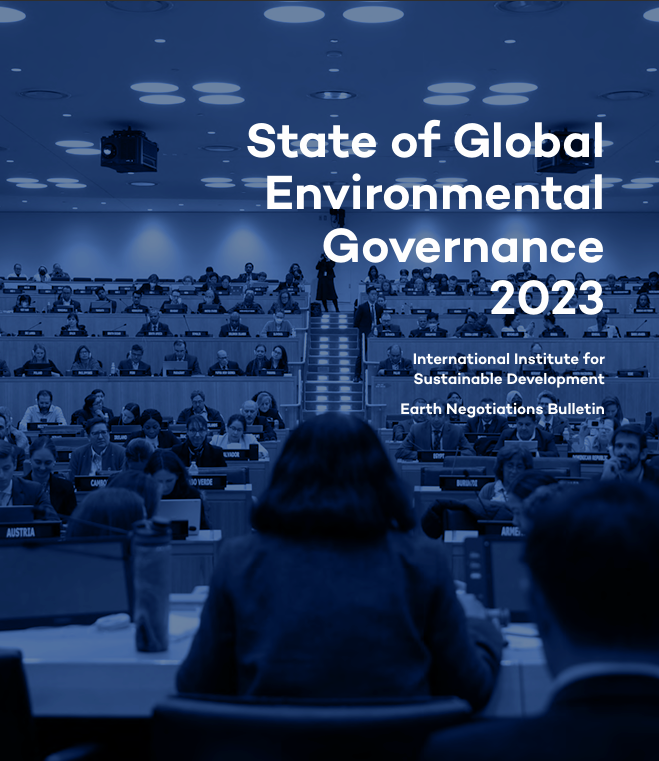Examines numerous essential findings and trends currently influencing environmental governance worldwide. Importantly, the report highlights several key points. Indeed, these findings and trends underscore the complexity and interconnectedness of global environmental governance, thereby necessitating collective and decisive action to tackle urgent environmental issues. State of Global Environmental Governance 2023
Key highlights
- Emphasis on sustainable and just economies: Underscores the importance of transitioning towards sustainable and just economies to address environmental challenges while promoting social equity.
- Focus on food systems and healthy nutrition: There is a growing recognition of the need to improve and promote healthy nutrition practices to ensure food security and sustainability.
- Energy decarbonization with universal access: Emphasizes the urgency of decarbonizing energy systems while ensuring universal access to clean and renewable energy sources.
- Urban and peri-urban development: The importance of sustainable urban and peri-urban development is highlighted as a key factor in addressing environmental issues and promoting city resilience.
- Protection of global environmental commons: Stresses the need to protect and preserve global environmental commons, such as oceans, forests, and biodiversity, for the well-being of present and future generations.
- Recognition of the impact of external factors: Acknowledges the significant impact of external factors such as the COVID-19 pandemic, abrupt climate changes, and armed conflicts on the progress towards sustainable development goals.
- Reaffirmation of the 2030 Agenda: The Political Declaration adopted at the Summit reaffirms the 2030 Agenda as the blueprint for sustainable development, highlighting the need for continued commitment to achieving the Sustainable Development Goals.
Overview
The Year at a Glance
Offers a thorough overview of significant developments and milestones in environmental governance for that year. Specifically, it effectively presents a snapshot of the critical events, notable accomplishments, and emerging challenges in global environmental governance in 2023. Consequently, it lays the groundwork for future sustainability and environmental stewardship initiatives.
Sub-sections
Reaching Milestones
Highlights key achievements in global environmental governance in 2023. Firstly, it mentions the adoption of the Global Framework on Chemicals, a significant progress in chemical management. Secondly, it notes the phase-out of mercury in cosmetics, a crucial step towards sustainable development. Lastly, it applauds the completion of the BBNJ instrument for marine biodiversity, representing a major advancement in marine conservation.
Funding Implementation
Underscores the necessity of adequate financing for environmental initiatives. It likely discusses various funding mechanisms and strategies essential for effectively implementing environmental goals. Indeed, the emphasis on financial resources underscores the critical role of funding in achieving sustainability in global environmental governance.
Missed Opportunities
Discusses the shortcomings of global environmental governance in 2023, such as unadopted decisions, unmet expectations, and lacklustre agreements, largely due to political compromises. Importantly, it likely highlights challenges in key events like the SDG Summit and Dubai Climate Change Conference. Ultimately, this report emphasizes the need for collective action and ambition to overcome environmental challenges.
Taking Stock in 2023
Delves into an in-depth analysis of the year’s progress and the challenges faced in global environmental governance. Significantly, this section provides a comprehensive overview of the progress made, the challenges encountered, and the opportunities that emerged, thereby underscoring the crucial importance of collective efforts to tackle environmental issues and meet sustainable development goals.
Sub-sections
Chemical Pollution
Evaluates global chemical pollution, highlighting the Global Framework on Chemicals and mercury phase-out in cosmetics. It then underscores the ongoing challenges in chemical management significantly impacting health and the environment, emphasizing the need for sustained efforts to mitigate negative effects across the chemical life cycle.
Sustainable Development
Reviews the 2023 progress towards the SDGs. It is likely to mention the UN Secretary-General’s report, which notably states that only 15% of the SDG targets are on track. Consequently, as the Global Sustainable Development Report underscored, it emphasizes the urgent need for transformative actions and comprehensive national plans to expedite progress towards achieving the SDGs.
Agriculture
Begins by discussing 2023’s global agriculture and food systems, specifically dealing with food security, sustainable practices, and environmental impact. Furthermore, it covers the necessity of improving sustainability, enhancing food system resilience, and promoting responsible practices. Moreover, it highlights the crucial role of agriculture in achieving sustainable development goals. Ultimately, it emphasizes the need for transformative actions in this sector.
Climate Change
Covers the progress and challenges faced in 2023 combating climate change. It starts by reviewing the Global Stocktake outcomes under the Paris Agreement. Moreover, it underlines the pressing need for actions to promote climate resilience and low-emission development. With this in mind, it strongly highlights the urgency of ramping up efforts to combat climate change, shifting to renewable energy, and improving global climate resilience.
Biodiversity
Opens the discussion on global conservation efforts in 2023. This includes the landmark BBNJ Agreement and the essential role of international cooperation. Simultaneously, it brings attention to biodiversity loss and habitat destruction. Consequently, it underscores the pressing need for enhanced conservation efforts worldwide.
Geopolitics
Explores the impact of geopolitics on environmental issues, emphasizing its influence on governance and global responses. It underscores the connection between geopolitics and environmental sustainability, highlighting the need for collaboration in addressing environmental problems in a diverse geopolitical environment.
- Armed Conflicts: Highlights that over 110 armed conflicts were ongoing in 2023, leading to severe humanitarian and ecological consequences. It discusses the implications of these conflicts on environmental sustainability and the challenges they pose to global governance efforts.
- Tensions and Violence: Mentions that many tensions existed in various regions, potentially escalating into violence. It likely explores how geopolitical tensions can hinder international cooperation on environmental issues and create obstacles to achieving shared sustainability goals.
- Humanitarian Concerns: Addresses the humanitarian impact of armed conflicts and geopolitical tensions on vulnerable populations, including refugees and internally displaced persons. It may discuss the need for coordinated efforts to address humanitarian crises exacerbated by geopolitical factors.
- Environmental Security: Discusses environmental security, the influence of geopolitics on environmental policies, and the intersection of security concerns and environmental governance, stressing the necessity of addressing environmental challenges in a geopolitical context.
Looking to 2024
Offers insights into the anticipated trends and challenges for the coming year. Furthermore, it presents a forward-looking viewpoint on global environmental governance, importantly stressing the importance of proactive measures, collaborative initiatives, and innovative solutions to address environmental issues and foster sustainability.
- Continued Progress and Challenges: Outlines 2024’s goals to continue the progress made in 2023, tackle ongoing challenges, and enhance global environmental governance for long-term sustainability.
- Technological and Ecological Change: Examines the influence of fast technological and ecological changes on environmental governance and how these evolving trends could shape future environmental policies from 2024 onwards.
- Global Health Initiatives: Covers 2024’s global health initiatives, like WHO’s second malaria vaccine rollout, emphasizing their potential benefits on public health and environmental sustainability.
- Democratic Elections and Policy Shifts: Analyzes the importance of 2024’s democratic elections on environmental policies, the influence of leadership changes in major economies on climate action, renewable energy initiatives, and international cooperation.
- Environmental Summits and Resolutions: Discusses 2024’s environmental events like the Future Summit and UN Environment Assembly, their key topics, proposed solutions, and their expected impact on environmental governance.



